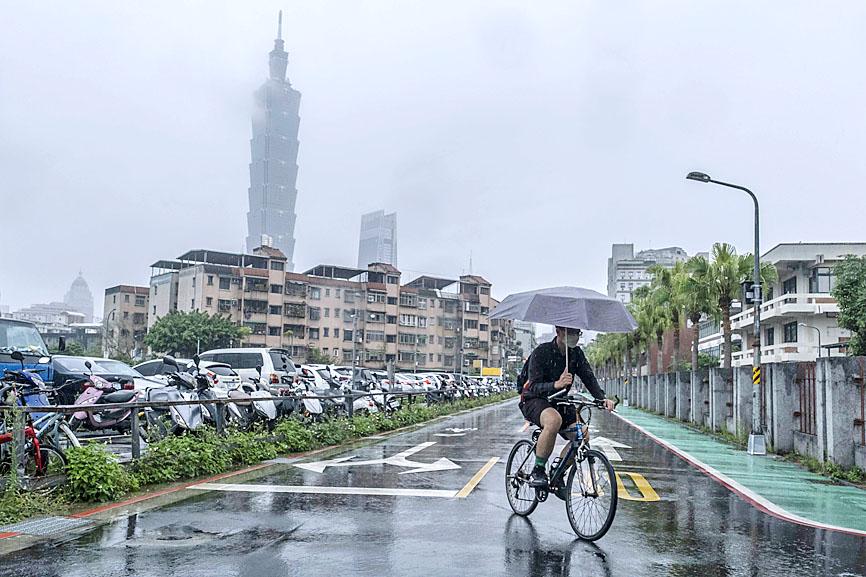Taipei this year fell from 33rd to 53rd in the “world’s most livable cities” ranking, an annual report published on Wednesday by The Economist said.
With the tagline “Life is getting back to normal, if not quite everywhere,” the report included 33 more cities in its annual “most livable cities” list this year for a total of 172 locations.
The Economist also included Taichung in the rankings, with a score of 80 to 90, similar to that of Taipei, but without indicating the city’s ranking.

Photo: Bloomberg
The Economist Intelligence Unit said that the Vienna replaced Auckland as the world’s most livable city, giving it back the title it held in 2018 and 2019.
In naming Vienna as an appealing city to live in, the unit and its survey noted the availability of entertainment venues as the local COVID-19 situation eases, well-rounded and stable infrastructure, and commendable healthcare.
The unit attributed Auckland’s drop to 34th this year to New Zealand’s COVID-19 response measures and the effects of the pandemic there.
Europe took six of the top 10 spots, with Copenhagen placing second in the rankings, followed by Zurich in third and Geneva, Switzerland, in sixth.
Frankfurt, Germany, took the seventh spot, while Amsterdam was ninth.
In North America, Calgary, Canada, shared the third spot with Zurich, while Vancouver took fifth and Toronto the eighth spot.
Osaka, Japan, and Melbourne shared the 10th spot.

UNCERTAINTY: Innolux activated a stringent supply chain management mechanism, as it did during the COVID-19 pandemic, to ensure optimal inventory levels for customers Flat-panel display makers AUO Corp (友達) and Innolux Corp (群創) yesterday said that about 12 to 20 percent of their display business is at risk of potential US tariffs and that they would relocate production or shipment destinations to mitigate the levies’ effects. US tariffs would have a direct impact of US$200 million on AUO’s revenue, company chairman Paul Peng (彭雙浪) told reporters on the sidelines of the Touch Taiwan trade show in Taipei yesterday. That would make up about 12 percent of the company’s overall revenue. To cope with the tariff uncertainty, AUO plans to allocate its production to manufacturing facilities in

TAKING STOCK: A Taiwanese cookware firm in Vietnam urged customers to assess inventory or place orders early so shipments can reach the US while tariffs are paused Taiwanese businesses in Vietnam are exploring alternatives after the White House imposed a 46 percent import duty on Vietnamese goods, following US President Donald Trump’s announcement of “reciprocal” tariffs on the US’ trading partners. Lo Shih-liang (羅世良), chairman of Brico Industry Co (裕茂工業), a Taiwanese company that manufactures cast iron cookware and stove components in Vietnam, said that more than 40 percent of his business was tied to the US market, describing the constant US policy shifts as an emotional roller coaster. “I work during the day and stay up all night watching the news. I’ve been following US news until 3am

COLLABORATION: Given Taiwan’s key position in global supply chains, the US firm is discussing strategies with local partners and clients to deal with global uncertainties Advanced Micro Devices Inc (AMD) yesterday said it is meeting with local ecosystem partners, including Taiwan Semiconductor Manufacturing Co (TSMC, 台積電), to discuss strategies, including long-term manufacturing, to navigate uncertainties such as US tariffs, as Taiwan occupies an important position in global supply chains. AMD chief executive officer Lisa Su (蘇姿丰) told reporters that Taiwan is an important part of the chip designer’s ecosystem and she is discussing with partners and customers in Taiwan to forge strong collaborations on different areas during this critical period. AMD has just become the first artificial-intelligence (AI) server chip customer of TSMC to utilize its advanced

Six years ago, LVMH’s billionaire CEO Bernard Arnault and US President Donald Trump cut the blue ribbon on a factory in rural Texas that would make designer handbags for Louis Vuitton, one of the world’s best-known luxury brands. However, since the high-profile opening, the factory has faced a host of problems limiting production, 11 former Louis Vuitton employees said. The site has consistently ranked among the worst-performing for Louis Vuitton globally, “significantly” underperforming other facilities, said three former Louis Vuitton workers and a senior industry source, who cited internal rankings shared with staff. The plant’s problems — which have not